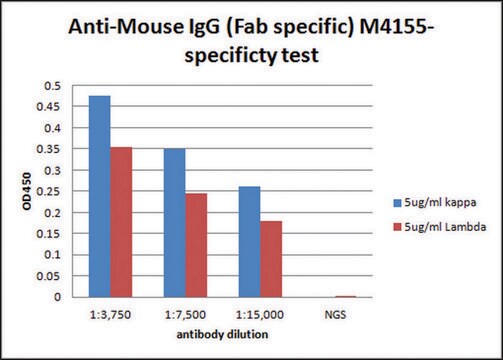SAB4200382
Anti-FAM48A /P38IP antibody produced in rabbit
~1.0 mg/mL, affinity isolated antibody
Sinonimo/i:
Anti-C13, Anti-C13ORF19, Anti-FP757, Anti-Family with sequence similarity 48, member A, Anti-SPT20, Anti-bA421P11.4, Anti-p38 interacting protein
About This Item
Prodotti consigliati
Origine biologica
rabbit
Livello qualitativo
Coniugato
unconjugated
Forma dell’anticorpo
affinity isolated antibody
Tipo di anticorpo
primary antibodies
Clone
polyclonal
Forma fisica
buffered aqueous solution
PM
antigen ~95 kDa
Reattività contro le specie
mouse, rat, human
Concentrazione
~1.0 mg/mL
tecniche
indirect immunofluorescence: 1-2 μg/mL using monkey COS7 cells
western blot: 1-2 μg/mL using whole extract of human HEK-293T cells
western blot: 2.5-5.0 μg/mL using whole extracts of mouse A20 and rat PC12 cells
Condizioni di spedizione
dry ice
Temperatura di conservazione
−20°C
modifica post-traduzionali bersaglio
unmodified
Informazioni sul gene
human ... FAM48A(55578)
mouse ... Fam48a(56790)
rat ... Fam48a(361946)
Descrizione generale
Specificità
Immunogeno
Applicazioni
Azioni biochim/fisiol
Stato fisico
Stoccaggio e stabilità
Esclusione di responsabilità
Non trovi il prodotto giusto?
Prova il nostro Motore di ricerca dei prodotti.
Codice della classe di stoccaggio
10 - Combustible liquids
Punto d’infiammabilità (°F)
Not applicable
Punto d’infiammabilità (°C)
Not applicable
Certificati d'analisi (COA)
Cerca il Certificati d'analisi (COA) digitando il numero di lotto/batch corrispondente. I numeri di lotto o di batch sono stampati sull'etichetta dei prodotti dopo la parola ‘Lotto’ o ‘Batch’.
Possiedi già questo prodotto?
I documenti relativi ai prodotti acquistati recentemente sono disponibili nell’Archivio dei documenti.
Il team dei nostri ricercatori vanta grande esperienza in tutte le aree della ricerca quali Life Science, scienza dei materiali, sintesi chimica, cromatografia, discipline analitiche, ecc..
Contatta l'Assistenza Tecnica.